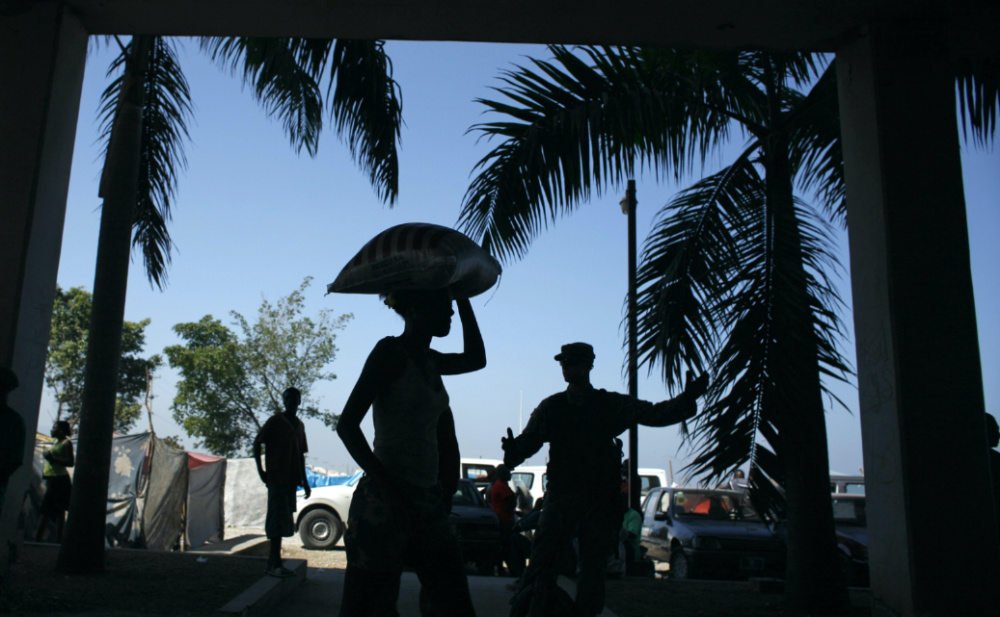London, UK
Thomson Reuters Foundation
Half of aid workers have experienced racism at work in the past year, with staff and activists saying agencies are failing to combat discrimination in their ranks, a global survey by the Thomson Reuters Foundation and aid consultancy Aid Works found.
An online survey of 286 aid workers in 63 countries found 143 people had experienced racism at work in the past year, ranging from having contributions overlooked, to pay disparities and overt racist comments, but fewer than half reported it.

A resident carries a bag of rice during a distribution of food in Port-au-Prince, on 3rd February, 2010. PICTURE: Reuters/Eduardo Munoz/File photo.
The findings come as aid agencies face closer scrutiny, with sexual abuse scandals tarnishing a $US30 billion sector that employs more than half a million people, and protests over racism sparking wider debate on entrenched discrimination.
“What aid agencies need to take from this is that they have been complicit for a very long time,” said Angela Bruce-Raeburn, a campaigner against racism in aid and the regional advocacy director for Africa at the Global Health Advocacy Incubator.
“When you say ‘What are you doing to combat it?’, you are asking people to change decades and decades of implicit bias, of exclusivity, of the good old boys network.”
More work is needed to ensure diversity, inclusion and accountability are always upheld within the United Nations system, said a spokeswoman for the secretariat in response to the survey’s findings.
Of those respondents who chose to share their workplace, the largest number said they worked for the UN and its agencies.
“Racism and discrimination have no place in the humanitarian system and we are committed to eliminating all forms of racism and racial discrimination in humanitarian work environments and operations,” she said.
“We are making progress but there is more to do and we will never be complacent.”
“Hot mess”
The survey was carried out online in August and September, and was open to all current and recent aid workers.
It found that three quarters of all respondents who identified as belonging to a racial or ethnic minority said they experienced racial discrimination in the previous 12 months, compared to about a quarter of non-ethnic minority workers.
The most common form of racism reported was microaggressions – an umbrella term for small, everyday demeaning incidents – which were reported by a third of all respondents, with many saying racism pervaded their work culture.
About half of those who experienced racism said it involved pay or benefits discrimination, while a similar number reported being overlooked for promotion, racist comments, and being discouraged from voicing opinions freely.
But only 66 workers – fewer than 50 per cent of those who experienced racism – reported it, with many saying they feared professional repercussions or that the complaint would not be handled well.
Of those who did go on to make formal complaints, about three-quarters were unhappy with how it was handled. Only one person was happy with the response. About 20 per cent said they were partially satisfied, and the remainder were unsure.
More than half of those who reported racism said they had experienced three or more incidents in the last year.
One Muslim aid worker said they were targeted with repeated jokes about eating pork, and been told by bosses that “if there’s an evacuation, I’ll be last to leave because priority will be given to European and other Western people”.
Another aid worker with a South Sudanese background said white international aid workers had “all sorts of stereotypes about the different South Sudanese ethnic groups” and he regularly heard them say “awful” and “inappropriate” things.
“Racism is such a hot mess in this industry that I decided to leave it for good and never looked back after 10 years of career. I just couldn’t take it anymore,” wrote one former aid worker who worked in Lebanon.
A number of white respondents said they had been victims of racism, while others said they had witnessed incidents towards ethnic minority colleagues.
“I have seen systemic racism, repeatedly, where white or ‘Western-presenting’ people are afforded greater trust, airtime and benefit of the doubt and are called to account less,” said one white respondent to the survey.
Systemic issues
A number of high-profile humanitarian organisations, including the United Nations and medical charity Medecins Sans Frontieres, have acknowledged racism within their organisations and pledged to take action.
However, there was overwhelming agreement among aid workers that the sector needs to do more.
More than 80 per cent of all respondents said humanitarian agencies were not doing enough to combat racism within their institutions or among staff.
Almost nine out of 10 of those surveyed said people of colour and local workers in countries where aid is being delivered were not given the same opportunities as international staff, with just six per cent saying everyone got an equal chance.
Locally hired staff are people from the country which is receiving aid, who are typically employed on different terms to “international” staff.
More than three-quarters said there were differences in pay, benefits and career progression for ethnic minority and locally-hired staff, while over half said they were less free to voice opinions.
Asked what concrete steps humanitarian groups should take to combat racism, many called for greater diversity at senior management level and the removal of disparities between local and international staff.
Aid workers also said organisations should examine their internal structure and culture as a whole.
“The system is unequivocally Eurocentric,” said one white respondent to the survey.
“We walked into this system and bought it wholesale because that was the packaging it came in, and at the time we were young and naive and it wasn’t cool to speak out…But it’s no longer possible to pretend we don’t know better.”






